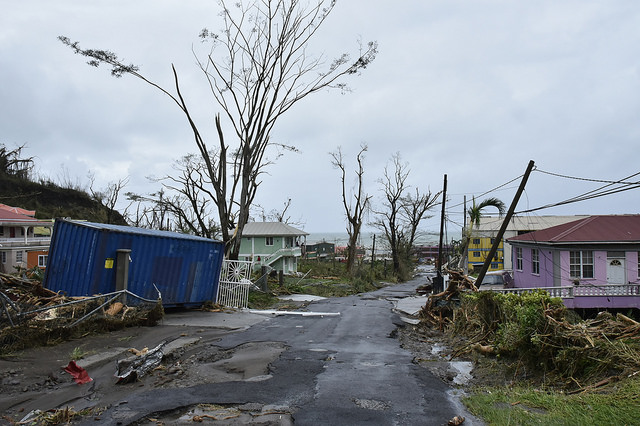The sex scandals shaking Hollywood, which uncover years of complacent and imposed silence, are only the tip of the iceberg of a problem we all know about: the arrogance of power. An evil that deepens its roots in history; a reality that unites victims and executioners. It is the bullying lived in homes, schools and jobs. It is the verbal and physical violence that women, immigrants, the disabled, the poorest, the indigenous and, at the international level, the least developed countries must endure.
We know it, and yet it hurts. It hurts to witness the constant, persistent, demeaning attitude of a president towards Latin American immigrants and countries; even to Puerto Rico that is part of the U.S. territory. There is no human mercy in the face of tragedies. The word solidarity is erased from the dictionary of a power increasingly hurtful, disrespectful.
Hurricanes Irma and Maria undoubtedly exacerbated evils that Puerto Rico had been dragging for years, but the population, at such a painful moment, deserves not only help but, above all, consideration.
In spite of everything, Puerto Ricans, as did Mexicans after the earthquakes, have reacted to their misfortunes with resilience, generosity and a lot of solidarity.
Rains and winds not only swept homes and lives; they left the country without electricity, water, gasoline, and with little food; problems, all, which have been transformed into new causes of death, even in hospitals, where it is very difficult to properly care for patients; particularly, those most seriously ill.
Little can help a few rolls of paper thrown at an audience who, astonished, listened to a speech that far from sending a message of encouragement and understanding, transformed the victims into culprits of the disaster caused by two hurricanes that climate change has turned into powerful weapons of destruction; guilty, even, of having «only» 16 dead at the time.
The island had a weak economy, and certainly there is a responsibility of its rulers; but the reasons for its crisis are more complex. One was the federal decision to eliminate tax exemptions that allowed US companies established in Puerto Rico to send their profits to their parent companies without having to pay federal income taxes. By losing this privilege, many companies began to retire, or to reduce their investments. This led to a considerable increase in unemployment and poverty. The country’s debt grew exponentially, until it reached a moment of crisis so strong that the then governor, Alejandro Garcia Padilla, had to admit that it was impossible to continue paying it. Puerto Rico’s commonwealth status does not allow it to avail itself of the United States Bankruptcy Code and, since it is not a sovereign nation, it cannot appeal to the International Monetary Fund.
The Obama administration signed the so-called Promise Act in 2016, which created a fiscal supervisory board, whose mission was «to work with the people and Government of Puerto Rico to create the foundation for sustainable economic growth, and to restore opportunity for the people of Puerto Rico.» In reality, this «Promise» resulted in a series of cuts to pensions and to health, education and other social programs, which aggravated the conditions of a society in which almost fifty percent of the population lives below poverty levels.
Another cause of the crisis in Puerto Rico can be found in the consequences on its economy of the “Jones Act». This law states that only American flag vessels can transport goods and passengers between United States ports, that these vessels must have been built in shipyards of United States, and that the crew must be an American crew. This law is not only at the base of the high cost of living in Puerto Rico —higher than that of the rest of the United States—, but it also prevents the development of a local naval industry that opens new possibilities for work and
Following devastation by hurricanes, the elimination of the Jones Act became key to addressing the urgent need for medicines and food; but the Trump administration suspended its application only for ten days, without a possibility for extension; and it is now virtually impossible to receive the international aid that would arrive with ships from other countries.
Meanwhile, messages coming from the White House are inconstant: sometimes they fuel hopes, and sometimes they add to the bewilderment of a population that still does not know well what it can count on to rebuild its life.
Puerto Rico needs humanitarian assistance; it requires oxygen to recover, and it needs it urgently before more dead people join the initial figure, which has already doubled.
Puerto Rico needs funds to rebuild an infrastructure that, while previously obsolete and deteriorated, it is now largely destroyed; it needs it, to give back hope to a population that is emigrating en masse, because it does not envision a future in their country; but, even more than that, the people of Puerto Rico need and deserve respect.
Photo Credits: Roosevelt Skerrit ©


